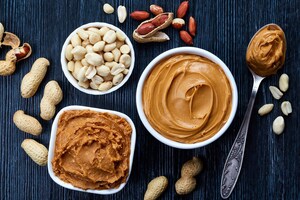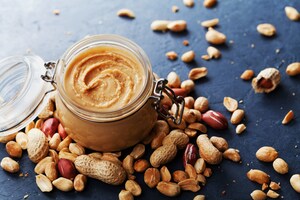ALBANY, Ga. , March 10, 2022 /PRNewswire/ -- According to The Peanut Institute, many countries around the world incorporate peanuts and peanut butter into some of their signature dishes—from satays and sauces to soups, stews and salads. The list is long and includes places like Africa, the Mediterranean, the Middle East, India, Central and South America and the Far East.
One of the reasons peanuts have been so widely adopted is the fact they're an affordable plant-based protein that's packed with vitamins and minerals. Just one ounce of peanuts contains seven grams of protein (more than any other nut), 19 vitamins and minerals plus fiber and heart-healthy fats.
So, whether they're called groundnuts in Africa, monkey nuts in the United Kingdom or goobers in the United States, peanuts deliver a host of life-long advantages.
"Studies from around the world have uncovered numerous health benefits associated with regular consumption of peanuts and peanut butter," says Dr. Samara Sterling, a nutrition scientist and research director with The Peanut Institute. "There's a growing bank of research that shows incorporating peanuts into your diet can improve life expectancy and help reduce the risk of a number of types of cancer and the incidence of type 2 diabetes."
Extended Life Expectancy
In 2000, researchers Gianni Pes and Michel Poulain identified Sardinia's Nuoro province as having the highest concentration of male centenarians1. This area was categorized as a "Blue Zone"—a region of the world where life expectancies were extraordinarily higher than average and had a high quality of life.
Over the next eight years, researchers identified a total of five distinct places with similar longevity: Okinawa, Japan; Sardinia, Italy; Nicoya, Costa Rica; Icaria, Greece; and Loma Linda, California.
One of their discoveries was that residents in these Blue Zones had specific meal habits with a common theme: a mostly whole food and plant-based diet with beans and legumes providing much of their protein2.
Reduced Cancer Risk
In addition to the Blue Zone findings, other studies have discovered diets that emphasize plant-based foods like peanuts can protect against cancer3,4. Peanuts are also packed with high amounts of phytochemicals—some of which block the activation of cancer-causing substances and enhance the immune system5.
Plus, peanuts contain resveratrol, which is a potent antioxidant that's shown to be protective against brain, skin, stomach and pancreatic cancers6, as well as phytosterols, which can inhibit colon, breast and prostate cancer cells7.
Protection Against Diabetes
As the prevalence of diabetes around the world continues to rise, studies have found choosing plant-based protein over meat can help prevent the development of type 2 diabetes8.
Peanuts and peanut butter are low GI (glycemic index) foods that contain healthy oils, protein and fiber, which have a positive effect on blood sugar control. A study showed that eating peanuts or peanut butter at breakfast can prevent blood sugar spikes that can cause a "crash" later in the day9.
To take a healthy culinary trip around the world with dishes that include peanuts and peanut butter, visit peanutinstitute.com for recipes that range from an African peanut soup and a Mediterranean grain medley bowl to Thai chicken lettuce cups and peanutty Oaxacan-flavored chili.
Based in Albany, Ga., The Peanut Institute is a non-profit organization supporting nutrition research and developing educational programs to encourage healthful lifestyles that include peanuts and peanut products. The Peanut Institute pursues its mission through research programs, educational initiatives and the promotion of healthful lifestyles to consumers of all ages. As an independent forum, The Peanut Institute is uniquely positioned to work with all segments of the food industry, the research community, academia, consumer organizations and governmental institutions.
Sources:
1. Poulain M, Pes GM, Grasland C, Carru C, Ferrucci L, Baggio G, Franceschi C, Deiana L. Identification of a geographic area characterized by extreme longevity in the Sardinia island: the AKEA study. Exp Gerontol. 2004 Sep;39(9):1423-9. doi: 10.1016/j.exger.2004.06.016. PMID: 15489066.
2. Buettner D, Skemp S. Blue Zones: Lessons From the World's Longest Lived. Am J Lifestyle Med. 2016;10(5):318-321. Published 2016 Jul 7. doi:10.1177/1559827616637066.
3. Dreher, M.L., Dietary Patterns, Whole Plant Foods, Nutrients and Phytochemicals in Colorectal Cancer Prevention and Management, in Dietary Patterns and Whole Plant Foods in Aging and Disease. 2018, Springer International Publishing: Cham. p. 521-555.
4. Arya, S.S., A.R. Salve, and S. Chauhan, Peanuts as functional food: a review. J Food Sci Technol, 2016. 53(1): p. 31-41.
5. Anand, P., et al., Cancer is a Preventable Disease that Requires Major Lifestyle Changes. Pharmaceutical Research, 2008. 25(9): p. 2097-2116.
6. Awad, A.B., et al., Peanuts as a Source of β-Sitosterol, a Sterol With Anticancer Properties. Nutrition and Cancer, 2000. 36(2): p. 238-241.
7. Bitok E, Sabaté J. Nuts and Cardiovascular Disease. Prog Cardiovasc Dis. 2018 May – Jun;61(1):33-37. doi: 10.1016/j.pcad.2018.05.003. Epub 2018 May 22. Review. PubMed PMID: 29800597.
8. Malik VS, Li Y, Tobias DK, Pan A, Hu FB. Dietary Protein Intake and Risk of Type 2 Diabetes in US Men and Women. Am J Epidemiol. 2016 Apr 15;183(8):715-28. Doi: 10.1093/aje/kwv268. Epub 2016 Mar 28. PubMed PMID: 27022032; PubMed Central PMCID: PMC4832052.
9. Barbour JA, Howe PR, Buckley JD, Bryan J, Coates AM. Cerebrovascular and cognitive benefits of high-oleic peanut consumption in healthy overweight middle-aged adults. Nutr Neurosci 2016:1-8.
SOURCE The Peanut Institute

WANT YOUR COMPANY'S NEWS FEATURED ON PRNEWSWIRE.COM?
Newsrooms &
Influencers
Digital Media
Outlets
Journalists
Opted In





Share this article